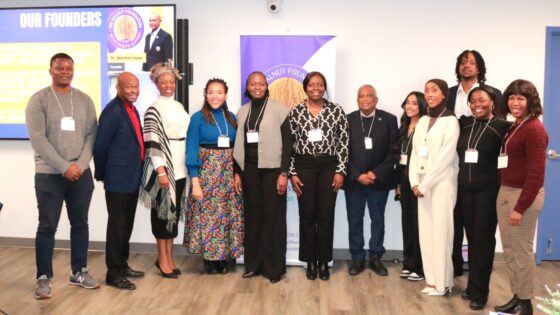on
BY: KATHY MCDONALD
“Di brunch di Boonoonoonos fi tru” The 19th annual festivity put on by the Jamaican Canadian Association was well attended and just about all levels of government federally, provincially and municipally were in attendance. It was especially wonderful because this year’s theme was “The Crisis in Black Education”. There was great optimism despite the momentous task at hand. All the speakers had this theme permeating their addresses or greetings: from the Minister of Education, the Honourable Mitzie Hunter; the President and Chancellor at Brandon University, Dr. Gervan Fearon to my colleague and Vice-Chair of the Peel District School Board (PDSB), Suzanne Nurse.
When you read some of the headlines lately it appears at the time that we take one step forward and two steps back. Despite this, I will implore all stakeholders not to weaken our resolve to see that our children stop being marginalized. We must not waver in ensuring that education becomes truly equitable and inclusive for all. It is important to create a framework for Black students to see themselves as part of their own learning. “Their education needs to value their experiences, their cultural knowledge, and their history. We need to make sure it is not on the margins”. Black History Month celebrations cannot be the only exposure that students get to the rich cultural heritage and the innumerable significant contributions that Black peoples have made. Most importantly we need to get away from the slavery narrative or the constant reference to Harriet Tubman, Martin Luther King and Rosa Parks for Black History Month. Now don’t get me wrong I am not saying that we should ignore all the lessons and implications of slavery. Nor am I suggesting we forget such great players in Black history. There is a rich and varied history before and after slavery. In Canada, we have our own “Rosa Parks”, Viola Desmond, who will be celebrated by being the new face of the ten-dollar bill in 2018. History is being made today by many great Canadians. A few of them are mentioned in this article.
When Black children excel the entire society benefits. An educated Black man will be employable, and once working will pay taxes and contribute to the pension plan, health care and the infrastructure of his community. When we have an incarcerated Black man or a disenfranchised Black man relying on welfare, it is a drain on taxpayers. So even for selfish financial reasons, it clearly makes sense for society to invest in the marginalized. Dr. Ann Lopez said it best when she delivered a thought provoking workshop for Peel employees last week. “Treat discipline as lovingly helping children to develop self-control”.
The PDSB’s We Rise Together Action Plan is an action plan that will incorporate three significant things: Professional development for teachers as we will highlight the duty of teachers to care; a culturally responsive curriculum that is student-centered and relevant to all our students. The Black experience will not be confined to February, and a commitment to work with families and communities to foster a trusting and nurturing environment. After all, both the PDSB and parents want what’s best for each and every child entrusted to our care. Remember that the PDSB employs over 19,000 people and most of them are caring, trustworthy individuals that truly believe in success for all.
A study conducted by the University of North Carolina states that “children of color, children disadvantaged racially and ethnically in the United States of America do better when they know their history: where they came from: how they got there and all the ways of survival that got their family to where they are. It is healing and protective for young people as they go forward in a sometimes hostile environment. Unaddressed history repeats itself…..Take the lessons of the past, survey the challenges of the present in order to go out into a stronger future”.
A few weeks ago I had the pleasure of listening to some great trailblazers at the Jean Augustine Center For Young Women’s Empowerment. They included the wise great lady herself, The Honourable Jean Augustine. This remarkable human being is one of the wisest, unpretentious and influential daughters of Canada. She was joined by Linda Carter one of Canada’s great supermodels and daughter of the first Canadian-born Black Judge George Carter; Robert Small the creative genius behind the Legacy Black History posters; The two-time Juno winner Liberty Silver and Ballet Creole founder Patrick Parson. Again, as each individual spoke about their personal journey, their triumphs and struggles the importance of a solid education took center stage.
In my column this week I urge all who read this editorial to reach out to a young person and make a commitment to help him or her excel in their educational journey. Each person that spoke at the aforementioned events all highlighted the fact that they did not do it alone. They all had an individual or several people that helped, mentored, encouraged or financially assisted them along their journey. So, journey with me, as together we change the world one young educated student at a time. Walk Good.Belle Marché.
Stay in the loop with exclusive news, stories, and insights—delivered straight to your inbox. No fluff, just real content that matters. Sign up today!













